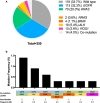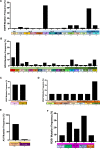Actionable Mutation Profiles of Non-Small Cell Lung Cancer patients from Vietnamese population
- PMID: 32066856
- PMCID: PMC7026432
- DOI: 10.1038/s41598-020-59744-3
Actionable Mutation Profiles of Non-Small Cell Lung Cancer patients from Vietnamese population
Abstract
Comprehensive profiling of actionable mutations in non-small cell lung cancer (NSCLC) is vital to guide targeted therapy, thereby improving the survival rate of patients. Despite the high incidence and mortality rate of NSCLC in Vietnam, the actionable mutation profiles of Vietnamese patients have not been thoroughly examined. Here, we employed massively parallel sequencing to identify alterations in major driver genes (EGFR, KRAS, NRAS, BRAF, ALK and ROS1) in 350 Vietnamese NSCLC patients. We showed that the Vietnamese NSCLC patients exhibited mutations most frequently in EGFR (35.4%) and KRAS (22.6%), followed by ALK (6.6%), ROS1 (3.1%), BRAF (2.3%) and NRAS (0.6%). Interestingly, the cohort of Vietnamese patients with advanced adenocarcinoma had higher prevalence of EGFR mutations than the Caucasian MSK-IMPACT cohort. Compared to the East Asian cohort, it had lower EGFR but higher KRAS mutation prevalence. We found that KRAS mutations were more commonly detected in male patients while EGFR mutations was more frequently found in female. Moreover, younger patients (<61 years) had higher genetic rearrangements in ALK or ROS1. In conclusions, our study revealed mutation profiles of 6 driver genes in the largest cohort of NSCLC patients in Vietnam to date, highlighting significant differences in mutation prevalence to other cohorts.
Conflict of interest statement
The authors declare no competing interests.
Figures



References
-
- Lindeman NI, et al. Molecular testing guideline for selection of lung cancer patients for EGFR and ALK tyrosine kinase inhibitors: guideline from the College of American Pathologists, International Association for the Study of Lung Cancer, and Association for Molecular Pathology. J. Thorac. oncology: Off. Publ. Int. Assoc. Study Lung Cancer. 2013;8:823–859. doi: 10.1097/JTO.0b013e318290868f. - DOI - PMC - PubMed
Publication types
MeSH terms
Substances
LinkOut - more resources
Full Text Sources
Medical
Research Materials
Miscellaneous

